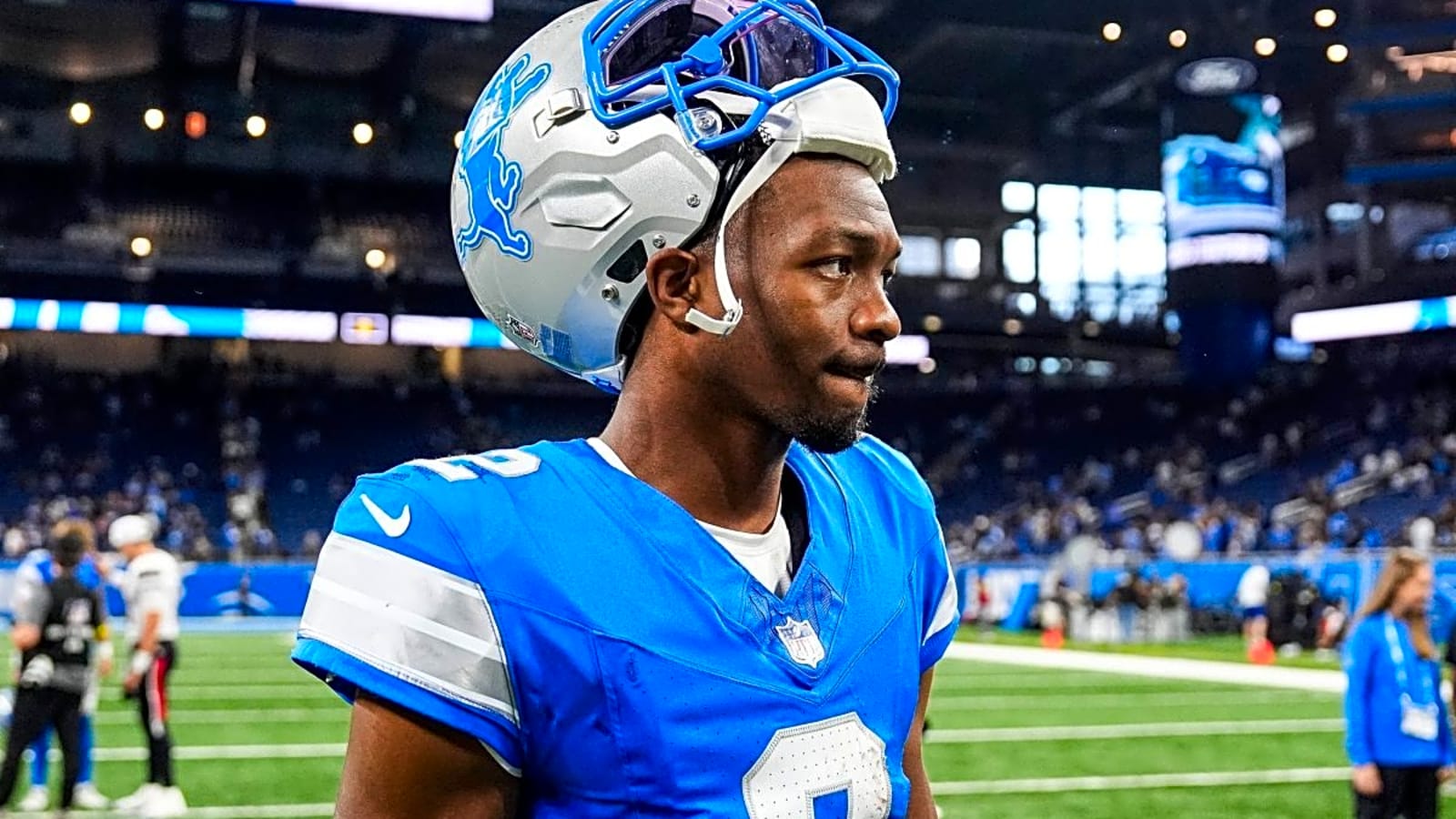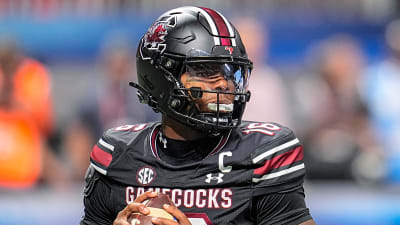
The NFL preseason often serves as a final audition for players fighting to secure their place on a roster, but sometimes the performance tells a story that no one wants to hear. For Detroit Lions quarterback Hendon Hooker, that harsh reality became crystal clear following Saturday’s preseason finale against the Houston Texans, when head coach Dan Campbell delivered perhaps the most direct assessment of a player’s future that any coach can give.
Speaking to reporters after the game, Campbell didn’t mince words when discussing Hooker’s trajectory with the organization. His suggestion that the third-year quarterback might need “a change of scenery” was as close to a public announcement of a parting of ways as coaches typically provide.
Detroit Lions Hendon Hooker: The Writing on the Wall
Campbell’s comments came after Hooker completed just 6 of 11 passes for 70 yards and an interception in what may have been his final appearance in a Detroit Lions uniform. The performance capped a disappointing preseason in which Hooker completed 22 of 40 passes for 187 yards, zero touchdowns, and three interceptions across four games.
“Look, it’s always how much development do you believe there is,” Campbell explained. “Because look, we are talking about Hooker right now. How much development do you believe there still is? Sometimes does the player need a change of scenery? What about our depth in other areas?”
The coach’s candid assessment reflects a fundamental shift in how the organization views Hooker’s role and potential. Rather than continuing to invest developmental time in a player who has struggled to make meaningful progress, Campbell seems ready to allocate those resources elsewhere.
A Journey That Never Found Its Footing
Hooker’s story with the Lions has been one of unfulfilled promise and persistent struggles. Selected in the third round of the 2023 draft, he entered the organization as a developmental project, having spent his rookie season rehabilitating from a torn ACL suffered during his final season at Tennessee.
The 2024 season was supposed to be his opportunity to establish himself as Jared Goff’s backup, but instead became a series of setbacks. When the Lions needed quarterback depth late in the season, they opted to sign Teddy Bridgewater out of retirement rather than rely on Hooker. The veteran even took snaps in a playoff game over the younger quarterback, a telling indication of where Hooker stood in the organization’s estimation.
This preseason was meant to be his chance at redemption, but Kyle Allen’s emergence as the clear backup choice has left Hooker as the odd man out. Allen overcame his own early struggles, including two interceptions in the Hall of Fame Game, to claim the No. 2 spot on the depth chart.
The Development Dilemma
Campbell’s comments reveal the complex calculations that NFL teams must make when evaluating young players. At 27 years old, Hooker doesn’t fit the typical developmental quarterback profile. He entered the league at 25, already older than many rookies, and his learning curve hasn’t shown the trajectory that organizations typically seek in long-term projects.
“How much development do you believe there still is?” Campbell asked rhetorically, highlighting the central question facing the Lions. In a league where roster spots are precious commodities, carrying a quarterback who hasn’t demonstrated significant growth over two seasons becomes increasingly difficult to justify.
The coach’s mention of needing depth at other positions—offensive line, defensive line, receiver, and defensive back—underscores the opportunity cost of retaining Hooker. Every roster spot represents a choice, and the Lions appear ready to invest theirs in areas where they see greater potential return.
A Fresh Start Elsewhere?
Campbell’s suggestion of a “change of scenery” isn’t necessarily a indictment of Hooker’s character or work ethic. Sometimes players need different systems, different coaching approaches, or different environments to reach their potential. The NFL is filled with examples of players who struggled with one organization only to find success elsewhere.
For Hooker, a fresh start might provide the reset he needs. Different offensive systems, coaching philosophies, or competitive situations could unlock aspects of his game that haven’t flourished in Detroit. The Lions’ high-powered offense and established veteran leadership might not have been the ideal environment for his development.
Roster Construction Realities
The Lions’ decision on Hooker reflects broader roster construction strategies under Campbell and general manager Brad Holmes. The team has prioritized building depth across multiple position groups, particularly after injuries derailed their 2024 playoff run. Carrying three quarterbacks becomes a luxury they can’t afford when other positions lack adequate depth.
Allen’s emergence has simplified the decision-making process. His preseason performance, while not perfect, showed enough competency and improvement to earn the backup role. More importantly, he brings veteran experience and a steady presence that the Lions value in their No. 2 quarterback.
The Business of Football
Campbell’s straightforward assessment exemplifies the business reality of professional football. Personal relationships and developmental investments must sometimes give way to practical roster needs. The Lions invested a third-round pick in Hooker and have given him two years to develop, but the return on that investment hasn’t materialized.
The coach’s willingness to publicly acknowledge these realities, while perhaps harsh, demonstrates the organization’s commitment to honest evaluation and decisive action. Rather than allowing sentiment or sunk costs to influence decisions, they’re making choices based on current performance and future potential.
Looking Ahead
As the Detroit Lions prepare for final roster cuts, Hendon Hooker’s situation serves as a reminder of how quickly NFL fortunes can change. A player who was once viewed as a potential long-term solution has become a candidate for release or trade within two seasons.
For the Detroit Lions, moving on from Hooker allows them to address depth concerns at other positions while clarifying their quarterback room hierarchy. Goff remains the established starter, Allen has earned the backup role, and the organization can explore other options for their third quarterback if needed.
The decision also reflects the Lions’ confidence in their evaluation processes. Rather than clinging to a player who hasn’t met expectations, they’re willing to acknowledge the miss and move forward. This type of decisive action, while difficult, often separates successful organizations from those that remain trapped by past decisions.
The Final Verdict
Campbell’s comments about Hooker needing a change of scenery represent more than just coach-speak—they’re a clear indication that the Lions are ready to move on from their 2023 third-round investment. After two seasons of limited progress and a preseason that failed to show significant improvement, the organization appears prepared to cut its losses.
For Hooker, the end of his Detroit chapter might ultimately prove beneficial. A fresh start with a different organization could provide the environment he needs to realize his potential. Sometimes the best outcome for all parties involved is recognizing when a situation isn’t working and making the difficult decision to pursue different paths.
As Tuesday’s roster deadline approaches, Hooker’s future with the Lions appears all but sealed. Campbell’s candid assessment has provided the clarity that many situations lack, leaving little doubt about the organization’s intentions. The only question remaining is whether Hooker’s departure will come via trade or outright release, but his time in Detroit seems destined to end either way.
More must-reads:
- The end of an era: USC vs. Notre Dame rivalry nears final chapter
- Blue Jays get encouraging injury update on George Springer
- The 'College basketball AP preseason No. 1 teams' quiz
Breaking News
Trending News
Customize Your Newsletter
 +
+
Get the latest news and rumors, customized to your favorite sports and teams. Emailed daily. Always free!








